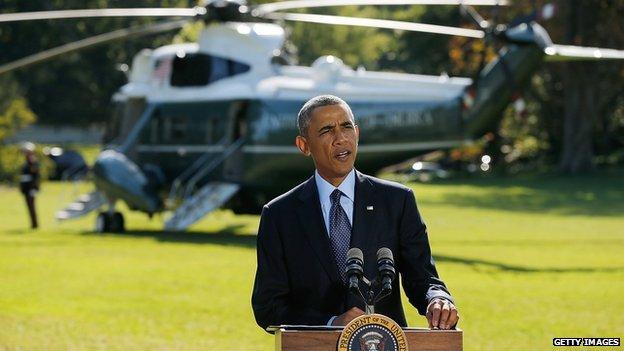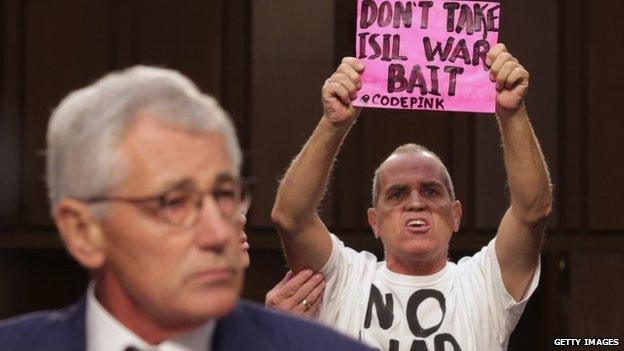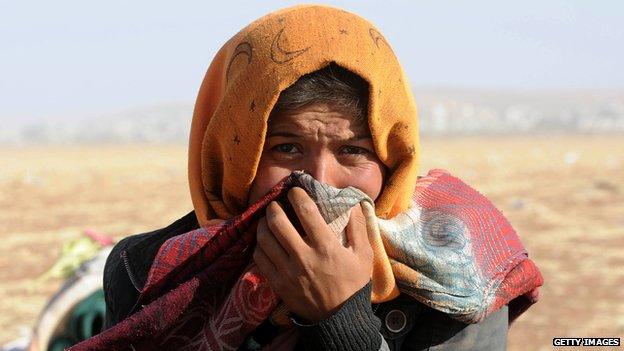US pundits raise questions about Syria air strikes
- Published
- comments

Obama: "We will not tolerate safe havens for terrorists."
The US and Arab allies are waging a military campaign against IS in Syria. US pundits weigh in on President Obama's decision to lead the campaign.
Some commentators in the US wonder whether the air campaign makes sense.
"Given that it will be months before the Free Syrian Army receives any training, the evidence from the Iraq campaign does not bode well for any immediate success in Syria," writes Tufts University's Daniel W Drezner in the Washington Post, external.
He uses a pollster-style approach, the kind usually seen during election campaigns, in his analysis of the US-led military campaign.
He says: "I'm 70% certain that there will be no fundamental change in the Islamic State's hold on territory in Syria and Iraq for the rest of this calendar year."

Hearings in Washington have been disrupted by protesters
Meanwhile on Twitter Robert Wright, external, a senior fellow at New America Foundation, casts doubt on US claims that the strikes have broad support around the world. President Obama has said: "This is not America's fight alone."
Yet Wright wonders whether the US really does have broad support around the world. He worries that the president's attempt to destroy enemies in the Middle East could inadvertently create new ones.
Wright tweets: "If anyone thinks allying w these arab states makes US attack on ISIS *less* an asset for jihadist recruiters, I have bad news for you."
Some pundits in the US applaud the military action, though.
Writing in the Atlantic, external, Jeffrey Goldberg says: "President Obama has taken the first, significant steps to at least slow, and possibly reverse, Isis's expansion."
Goldberg says it is clear who is leading the fight - and also who will be held responsible.
"Obama has spread around the risk, but make no mistake, this is an American fight," Goldberg writes. "If President Obama wasn't convinced that the US is - and should be - the world's sole remaining superpower, he is now."
Meanwhile Fox News host and commentator Howard Kurtz, external writes admiringly about the president's forthright manner.
During the president's speech about the military campaign, Kurtz tweets: "Obama, on the [White House] lawn, seems more forceful about fighting Isis, less discursive, more like a war president."

US-led forces attack IS - meanwhile many Syrians, such as this individual, are fleeing to Turkey
As these commentators show, presidents usually have broad domestic support during wartime, even from those who usually complain about them, at least in the beginning of their military campaigns.
Obama's supporters acknowledge - and even celebrate - that the campaign is led by the US. Harvard's Nicholas Burns, writing in the Boston Globe, external, applauds the president's decision to launch the air strikes in Syria.
Burns, who is a former US ambassador, uses the collective "we" in his column about the president's actions.
He writes: "Americans should expect this to be a long, dangerous, and often frustrating mission. But we would be derelict in strategic and even moral terms if we left unopposed a vicious and predatory terrorist group that could ignite an even more bloody regional war engulfing not only Iraq and Syria, but also neighbouring Jordan, Lebanon, and even Turkey."
He adds: "Obama has launched a new and necessary phase in the battle against Isis. It is a fight we did not seek but must now pursue."
Well, the bombs have fallen. People in the US and in other countries - both those who support the president and those who condemn him - are wondering what will happen next.
Follow Tara McKelvey, external on Twitter.